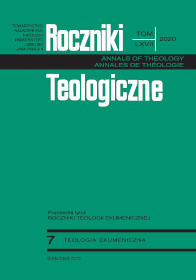Reconciliation Needs Remembrance: The German-Polish Case
Abstrakt
Pojednanie wymaga pamięci: przypadek niemiecko-polski
Artykuł podkreśla zależności między pojednaniem i pamięcią poprzez ocenę, z ekumenicznie zorientowanej perspektywy luterańskiej, przykładów dyskursów niemiecko-polskich w XX wieku, dotyczących aspektów wewnątrzosobowych, międzyosobowych, wewnątrzkulturowych, międzykulturowych i transkulturowych. Opierając się na badaniach nad pamięcią, pojednaniem oraz na parnerstwie między Münster i Lublinem, formułuje pewien program jednającej pamięci jako narzędzia dla wspólnych projektów dialogu ekumenicznego i transkulturowego poprzez dzielenie doświadczeń oraz umożliwianie rytuałów, które czynią te projekty zrównoważonymi.
Bibliografia
Assmann, Aleida. 2011. Cultural memory and Western civilization. Cambridge: Cambridge University Press.
Assmann, Jan, and John Czaplicka. 1995. “Collective memory and cultural identity.” New German Critique, No. 65: Cultural History/Cultural Studies, 125-133.
Assmann, Jan. 2006. Religion and Cultural Memory. Stanford: Stanford University Press.
Erll, Astrid. 2011. Memory in culture. Basingstoke: Palgrave Macmillan
Fivush, Robyn. 2007. “Maternal Reminiscing Style and Children’s Developing Understanding of Self and Emotion.” Clinical Social Work 35: 37–46.
Franzenburg, Geert. 2012. “Distance, Remembrance, Tolerance: European Remarks.” Problems of Education in the XXI Century 47: 40–49.
Franzenburg, Geert. 2013. “Displaced Values: From Remembrance To Resilience.” Problems of Education in the XXI Century 56: 59–65
Franzenburg, Geert. 2015. “Remembering rituals and rules.” Trimda Forum 4 (self-publishing).
Franzenburg, Geert. 2016a. “Der Bischof und die Nonne [The bishop and the nun]. Roczniki Teologiczne 43, z. 7: 195–206.
Franzenburg, Geert. 2016b. “Erinnertes äußern (expressing memories).” Europa-Forum Philosophie 65: 85–100
Franzenburg, Geert. 2016c. “How to draw benefit from remembrance.” Trimda Forum 5 (self-publishing)
Glaser, Barney G., and Anselm L. Strauss. 1967. The discovery of grounded theory. Chicago: Aldine Transaction.
Troebst, Stefan. 2005. “Jalta versus Stalingrad, Gulag versus Holocaust.” In Stefan Troebst. Postkommunistische Erinnerungskulturen im östlichen Europa (post-communistic memories in Eastern Europe). Wroclaw: Wroclaw University Press.
Welzer, Harald. 2008. “Communicative Memory.” In Cultural Memory Studies, edited by Astrid Erll and Ansgar Nünning, 285–98. Berlin: De Gruyter.
Copyright (c) 2020 Roczniki Teologiczne

Utwór dostępny jest na licencji Creative Commons Uznanie autorstwa – Użycie niekomercyjne – Bez utworów zależnych 4.0 Międzynarodowe.





